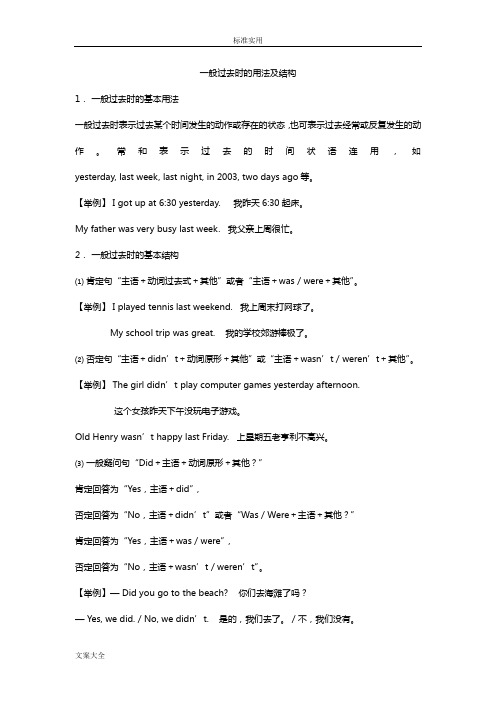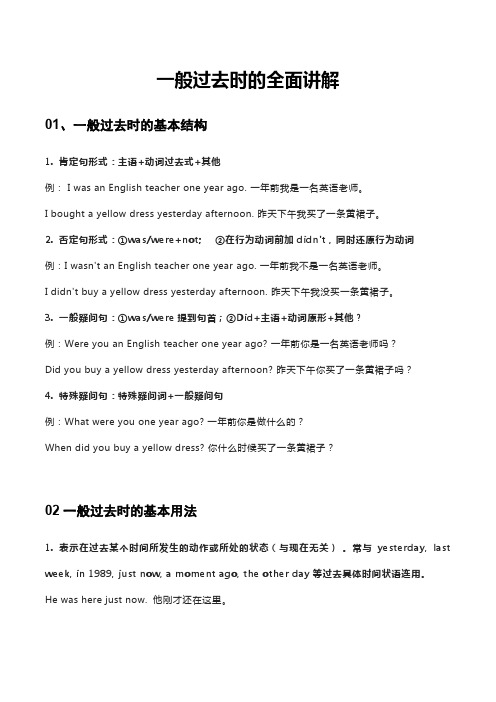一般过去式疑问句否定句讲解与练习
- 格式:doc
- 大小:23.00 KB
- 文档页数:2

一般过去时的用法及结构1.一般过去时的基本用法一般过去时表示过去某个时间发生的动作或存在的状态,也可表示过去经常或反复发生的动作。
常和表示过去的时间状语连用,如yesterday, last week, last night, in 2003, two days ago等。
【举例】 I got up at 6:30 yesterday. 我昨天6:30起床。
My father was very busy last week. 我父亲上周很忙。
2.一般过去时的基本结构⑴肯定句“主语+动词过去式+其他”或者“主语+was/were+其他”。
【举例】 I played tennis last weekend. 我上周末打网球了。
My school trip was great. 我的学校郊游棒极了。
⑵否定句“主语+didn’t+动词原形+其他”或“主语+wasn’t/weren’t+其他”。
【举例】 The girl didn’t play computer games yesterday afternoon.这个女孩昨天下午没玩电子游戏。
Old Henry wasn’t happy last Friday. 上星期五老亨利不高兴。
⑶一般疑问句“Did+主语+动词原形+其他?”肯定回答为“Yes,主语+did”,否定回答为“No,主语+didn’t”或者“Was/Were+主语+其他?”肯定回答为“Yes,主语+was/were”,否定回答为“No,主语+wasn’t/weren’t”。
【举例】— Did you go to the beach? 你们去海滩了吗?— Yes, we did./No, we didn’t. 是的,我们去了。
/不,我们没有。
— Was your weekend OK? 你的周末过得还行吧?— Yes, it was./No, it wasn’t. 是的,还行。
/不,不行。

一、一般现在时(一)概念:表示经常性或习惯性的动作,或存在的状态1、肯定句:主语+谓语+其他。
She reads English everyday .2、否定句:主语+don’t/doesn’t+谓语+其他。
He doesn’t get up at 6:30 in the morning .3、一般疑问句:Do/Does+主语+V原+其他?Do you like English ? Yes, I do. /No, I don’t .4、特殊疑问句:特殊疑问词+do/does+主语+V原+其他?What time do you get up every morning ?Where does your father work ?(四)具体用法1、表示经常性或习惯性的动作,或存在的状态,常与表示频率的时间状语如:often , sometimes , usually,always , seldom,never, every day /year/month...), once/twice a week (month , year , etc.) , on Sundays等连用。
I leave home for school at seven every morning .2、在以when,if, as soon as, as long as等连词引导的从句中,当主句的谓语动词是一般将来时,那么从句的谓语动词通常用一般现在时来表示将来要发生的动作。
(主将从现)I'll tell him the news when he comes back. 他回来时,我将告诉他这个消息。
If you come this afternoon,we’ll have a meeting.今天下午如果你来,我们就开个会。
3、描述事物的状态、性质、特征等,例如:The door is open. 门是开着的。
The apple is sweet.这个苹果是甜的。

一般过去时的全面讲解01、一般过去时的基本结构1. 肯定句形式:主语+动词过去式+其他例: I was an English teacher one year ago. 一年前我是一名英语老师。
I bought a yellow dress yesterday afternoon. 昨天下午我买了一条黄裙子。
2. 否定句形式:①was/were+not; ②在行为动词前加didn't,同时还原行为动词例:I wasn't an English teacher one year ago. 一年前我不是一名英语老师。
I didn't buy a yellow dress yesterday afternoon. 昨天下午我没买一条黄裙子。
3. 一般疑问句:①was/were提到句首;②Did+主语+动词原形+其他?例:Were you an English teacher one year ago? 一年前你是一名英语老师吗?Did you buy a yellow dress yesterday afternoon? 昨天下午你买了一条黄裙子吗?4. 特殊疑问句:特殊疑问词+一般疑问句例:What were you one year ago? 一年前你是做什么的?When did you buy a yellow dress? 你什么时候买了一条黄裙子?02一般过去时的基本用法1. 表示在过去某个时间所发生的动作或所处的状态(与现在无关)。
常与yesterday, last week, in 1989, just now, a moment ago, the other day等过去具体时间状语连用。
He was here just now. 他刚才还在这里。
What did you do yesterday? 你昨天做了什么事?2. 在过去一段时间内的经常性或习惯性动作。

一般过去式及练习一、基本概念一般过去时(simple past tense)表示过去某个时间里发生的动作或状态;过去习惯性、经常性的动作、行为;过去主语所具备的能力和性格。
二、基本结构主语+动词过去式+其他否定形式①was/were+not;②在行为动词前加didn't,同时还原行为动词主语+do+其他?例句She often came to help us in those days. Ididn't know you were so busy.一般过去式的构成形式肯定式疑问式否定式疑问否定式I worked Did I work? I did not work Did I not work?He(she,it) worked Did he(she,it)work?He (she,it)didnot workDid he(she,it)notwork?We worked Did we work? We did not work Did we not work?You worked Did you work? You did not work Did you not work?They worked Did they work? They did not work Did they not work?三、一般过去时的用法(1)一般过去时表示在过去某个特定时间发生,也可以表示过去习惯性、经常性的动作。
一般过去时不强调动作对现在的影响,只说明过去的事情。
句式:主语+过去动词+宾语+其他如:I had a word with Julia this morning.今天早晨,我跟朱丽亚说了几句话。
He smoked many cigarettes a day until he gave up. 他没有戒烟的那阵子,抽烟抽得可凶了。
(2)一般过去时常与表示过去的时间状语或从句连用,如:yesterday, last week, in 1993, at that time, once, during the war, before, a few days ago, when 等等。

一般过去时旳练习句子变化形式(一)一般过去时旳一般疑问句(1)1.把 was, were放在句首, 其他位置不变。
由Was…? 引导旳一般疑问句, 肯定答为: Yes,… was.否认回答为: No,…wasn’t;由Were…?引导旳一般疑问句, 肯定回答为: Yes,…were.否认回答为: No,…weren’t.如:She was happy yesterday.---Was she happy? Yes, she was.(肯定回答) No, She wasn’t(否认回答)(2)They were in Li Yan’s home last night.(3)---Were they in Li Yan’s home last night?-Yes, they were.(肯定回答)--No, they weren’t(否认回答)2.在行为动词旳句子中, 要用助动词did 来引导, 其他旳语序不变。
要注意旳是, 要把行为动词旳过去式改为原形。
肯定回答为: Yes,…did;否认No,…didn’t.如: John played computer games last night.---Did John play computer games last night?Yes, he did. No,he didn’t(二)一般过去时旳否认句1.在表达过去存在旳状态旳句子中, 相接在was, were旳背面加上not。
如:(1)He was in the park last Sunday.He was not in the park last Sunday.(2) We were busy last week.We were not busy last week.2.在表达过去旳时间发生旳动作旳句子中, 要在行为动词旳前面加助动词didn’t.然后把过去式旳行为动词改为动词原形。
即: didn’t+ 动词原形。

一般过去时的用法及结构1.一般过去时的基本用法一般过去时表示过去某个时间发生的动作或存在的状态,也可表示过去经常或反复发生的动作。
常和表示过去的时间状语连用,如yesterday, last week, last night, in 2003, two days ago 等。
【举例】 I got up at 6:30 yesterday. 我昨天6:30起床。
My father was very busy last week. 我父亲上周很忙。
2.一般过去时的基本结构⑴肯定句“主语+动词过去式+其他”或者“主语+was/were+其他”。
【举例】 I played tennis last weekend. 我上周末打网球了。
My school trip was great. 我的学校郊游棒极了。
⑵否定句“主语+didn’t+动词原形+其他”或“主语+wasn’t/weren’t+其他”。
【举例】 The girl didn’t play computer games yesterday afternoon.这个女孩昨天下午没玩电子游戏。
Old Henry wasn’t happy last Friday. 上星期五老亨利不高兴。
⑶一般疑问句“Did+主语+动词原形+其他”肯定回答为“Yes,主语+did”,否定回答为“No,主语+didn’t”或者“Was/Were+主语+其他”肯定回答为“Yes,主语+was/were”,否定回答为“No,主语+wasn’t/weren’t”。
【举例】— Did you go to the beach 你们去海滩了吗— Yes, we did./No, we didn’t. 是的,我们去了。
/不,我们没有。
— Was your weekend OK 你的周末过得还行吧— Yes, it was./No, it wasn’t. 是的,还行。
/不,不行。
⑷特殊疑问句:特殊疑问词+一般疑问句(顺序)【举例】— What did Li Lei do last weekend 李雷上周末干什么了— He visited his grandparents. 他去看了他的祖父母。
小学英语一般过去时专项讲解、练习和参考答案一般过去时专项讲解与练习一、概念:一般过去时表示过去某一时候发生的动作或存在的状态。
常与一般过去时连用的时间状语有:yesterday; 昨天just now刚才the day before yesterday;前天⋯⋯ago ⋯⋯之前(例如:三天前 three days ago )Last ⋯⋯上一个⋯(例如:上周星期天last Sunday )in 1990在1990年(in+过去时间)二、分类(一) be 动词的一般过去时:肯定句:主语 +be 动词的一般过去时( was/were)否定句:主语+be动词的一般过去时(was/were)+not一般疑问句: be 动词的一般过去时( was/were )+主语(二) there be结构的一般过去时与be 动词的一般过去时的变化基本一致。
(三)一般动词的过去时:肯定句:主语 +动词的过去时( I laughed.)否定句:主语 +did not+ 动词原形( I didn’t laugh.)一般疑问句: Did+主语 +动词原形( Did you laugh?)三.巧记 chant动词一般过去时,表示过去发生事;be 用 was 或用 were, have,has变had;谓语动词过去式,过去时间坐标志;一般动词加 -ed ,若是特殊得硬记。
否定句很简单,主语之后didn ’ t 添;疑问句也不难, did 放在主语前;如果谓语之前有 did ,谓语动词需还原;动词若是 was,were, 否定就把 not 添。
四、习题练习(一)用动词的适当形式填空:1.He ______ (work) in that bank four years ago.2.She ______ (live) in the US last Monday.3.I ______ (see) him yesterday.4.He _______(come) to school at 6 o’clock this morning.5.The boy _______ (have) a bad cold yesterday.6.When _______ you _______ (buy) that house?7.He _______(tell) a story to his daughter yesterday.8._____ you ____ (try) to call me last night?9.What _______you _______ (buy) in the shop?I ______ (buy) a coat just now.10. The doctor ______ (get) up late this morning.11.She ________ (paint) the wall last month.12.My mother _______ (be) a worker 20 years ago.13.________ (be) you here just now?No, I ________ (be not) here.14.Why _______ your brother _______ (cry) last night?15.It ______(be) my mother’s birthday yesterday.(二)翻译下列句子:1.我上周去看爷爷和奶奶了。
一般过去时1.一般过去时表示在过去某一时间发生的动作或存在的状态表示时间的词有:yesterday,this morning/afternoon/evening,last+时间(上个...)last night,last Sunday,last week,last year2.一般过去时的基本结构肯定句式①主语+was/were+其他例句:He was here yesterday.②主语+动词过去式+其他例句:I went to play basketball last Sunday.否定句式①主语+was/were+not+其他例句:She wasn’t at home this morning.②主语+didn’t+动词原形+其他例句:I didn’t find you yesterday..一般疑问句①Was/Were+主语+其他例句:Were you at school last week?②Did+主语+动词原形+其他例句:Did you play football yesterday?特殊疑问句特殊疑问词(如what,why,when,where等)+一般疑问句句式例句:Where were you yesterday?What did you do yesterday?3.动词的过去式规则动词①一般情况下直接在动词后+ed例:work-worked look-looked walk-walked②以e结尾的单词直接+d例:live-lived hope-hoped use-used③以辅音字母+y结尾的,改y为i再+ed例:study-studied carry-carried以元音字母+y,直接+ed例:enjoy-enjoyed play-played⑤以重读、一个辅音字母结尾的闭音节结尾的动词,双写最后的辅音字母+ed例:stop-stopped plan-planned prefer-preferred不规则动词(书本76页表格)动词原形过去式动词原形过去式is/am was do didare were get gotbegin began go wentbuy bought have hadcome came make maderead read see sawrun ran take tookeat ate一般过去时练习题一、写出下列动词的过去式1.is/am_____2.fly_____3.plant_____4.are_____5.drink_____6.play_____7.go_____8.make_____9.do_____10.dance_____11.worry_____12.ask_____13.eat_____14.pass_____二、用所给动词的适当形式填空1.He_____(be)at home last night.2.He_____(visit)the Great Wall last year.3.We_____(have)a good time yesterday.4.We_____(go)to school by bus last year.5.Sam_____(did)the housework yesterday.6._____(do)you______(play)the violin this morning?三、选择题1.The two girls____all in Class1last year.A.areB.wasC.were.D is2.This morning he____a taxi.A.tookB.takesC.take.D is taking3.I_____to school at8o’clock yesterday.A.goB.am goingC.went D goes4.-What did you do last night?-I______a story bookA.readB.readedC.am reading D reads。
一般过去时的肯定句,否定句,一般疑问句,特殊疑问句的结构及例句
一般过去时是一种常用的时态,表示过去某个时间发生的动作或状态。
下面是一般过去时的肯定句、否定句、一般疑问句和特殊疑问句的讲解和例句:
1.肯定句:
•结构:主语+ 动词的过去式+ 宾语
•例句:I worked hard yesterday.(我昨天努力工作。
)
2.否定句:
•结构:主语+ did not + 动词原形+ 宾语
•例句:I did not eat breakfast this morning.(我今天早上没有吃早餐。
)
3.一般疑问句:
•结构:Did + 主语+ 动词原形+ 宾语
•例句:Did you go to the party last night?(你昨晚去参加聚会了吗?)
4.特殊疑问句:
•结构:疑问词+ did + 主语+ 动词原形+ 其他?
•例句:When did you finish your homework?(你什么时候完成你的作业的?)
以上是一般过去时的肯定句、否定句、一般疑问句和特殊疑问句的结构和例句,希望能帮助到您更好地理解和运用。
一般过去时的概念:一般过去时表示过去某个时间发生的动作或存在的状态。
常和表示过去的时间状语连用,如:last year, yesterday等。
例如:I saw him in the street yesterday. 昨天我在街上看见他了。
一般过去时的结构1、肯定形式:主语+动词过去式+其他例句:She often came to help us in those days.2、否定形式:①was/were+not;②在行为动词前加didn't,同时还原行为动词例句:I didn't know you like coffee.3、一般疑问句:①Did+主语+谓语动词原型+其他?②WasWere+主语+表语?例如:-Did you go to Beijing last week?-Yes, we did. (No, we didn't.)4、一般过去时的特殊疑问句的构成:疑问词+did+主语+动词原形+其它?例如:-What did you do last night?-I did my homework.动词过去式的构成:(1)规则动词过去式的构成有四条规则:①一般在动词原形末尾直接加上-ed。
如:look-looked。
②以不发音的字母e结尾的动词,去e再加-ed。
如:live-lived。
③末尾只有一个辅音字母的重读闭音节(辅元辅结构),先双写这个辅音字母,再加-ed。
如:stop-stopped。
④末尾是辅音字母+y结尾的动词,先变y为i,然后再加-ed。
如:study-studied。
(2)不规则动词的过去式需特殊记忆。
如:am(is)-was, are-were, go-went, come-came, take-took, have (has)-had等。
一般过去时口诀一般过去时并不难,表示过去动作、状态记心间。
动词要用过去式,时间状语句末站。
否定句很简单,didn't 站在动词原形前,其它部分不要变。
课后练习
一般过去式的否定句
1.动词是Be动词时,一般过去时的否定式是在be动词后加not。
句型:主语+wasn’t/weren’t…
I was in Beijing yesterday. We were in Beijing yesterday.
否定句:I wasn’t in Beijing yesterday. We weren’t in Beijing yesterday. Exercises(练习):
( ) 1. It ____________ (not be) Ben's birthday last Friday.
A. wasn’t
B. weren’t
C. isn’t
D. aren’t
( ) 2. These men_________________ (not be) firemen a week ago.
~
A. wasn’t
B. weren’t
C. not be
D. aren’t
( ) 3. They _____________ (not be) in Beijing three days ago.
A. wasn’t
B. weren’t
C. not is
D. aren’t
( ) 4. It ____________ (not be) the 2nd of November yesterday.
A. wasn’t
B. weren’t
C. not are
D. aren’t
2.动词是行为动词时,一般过去时的否定式是在动词原形前加助动词did not (didn’t).句型:主语+didn’t+动词原形
I told them the news yesterday.
否定句:I didn’t tell them the news yesterday.
Exercises(练习):
#
1. Miss Guo ______________ (not get) up late the day before yesterday.
2. We all ______________ (not have) a good time three days ago.
3. She _____________ (not find) a beautiful butterfly just now.
4. I ____________ (not watch) a cartoon yesterday evening.
5. Her father ___________ (not read) a newspaper last night.
行为动词一般过去时的疑问式
一、一般过去式的一般疑问句:
1.有be动词时,把be动词提前
句型:Was+主语+… / Were+主语+ …
!
There were three cups of tea on the table just now.
一般疑问句:Were there three cups of tea on the table just now
Yes, there was. No, there wasn’t.
1. There were some oranges in the cup.(变一般疑问句)
_________ there ___________ orange in the cup
2. It was Monday yesterday. (变一般疑问句)
_________ it Monday yesterday
3. Mary and Mike were in Shanghai last month. (变一般疑问句)
_________ Mary and Mike in Shanghai last month.
2.动词是行为动词时,在句首加助动词did
…
Did+主语+动词原形+其他
They finished their work at four.
一般疑问句:Did the y finish their work at four Yes, they did. No, they didn’t.
Exercises(练习):
he ______ (go) to that morning Yes, he _____.
brother ___________(find) some meat in the fridge(冰箱). No, he _________.
Mary _______ (read) an interesting book about history Yes, she __________.
the students of Class Six _________(have) an English lesion the day before yesterday No, they didn’t.
二、一般过去时的特殊疑问式
1.动词是行为动词时: 疑问词+did+主语+动词原形……
《
They finished their work at four.
A B
对划线部分提问: A:What did they do at four
B:When did they finish their work
Exercises(练习):
1.They went to park by car yesterday.
________ _________ they __________ to park yesterday
2.They did their homework yesterday evening.
________ did they_________ yesterday evening
3.Her sisters flew kites in the park last Friday.
!
________ did her sisters _________kites last Friday
4. I liked the red shirt in the past.
________ shirt did you ________ in the past.
2.有be动词时: 疑问词+ was/were+主语+其他
Jack was in the classroom just now.
A B
对划线部分提问: A: Who was in the classroom just now
B: Where was Jack just now
1.Mary and Peter were in Beijing five days ago.
________ ________ Mary and Peter five days ago
2.。
3.There were four teachers in the office.
_______ ________ teacher _______ there in the office
4.He was a policeman last year.
_______ ________ he in the past
5.Mike was a teacher in the past.
________ _________ a teacher in the past。